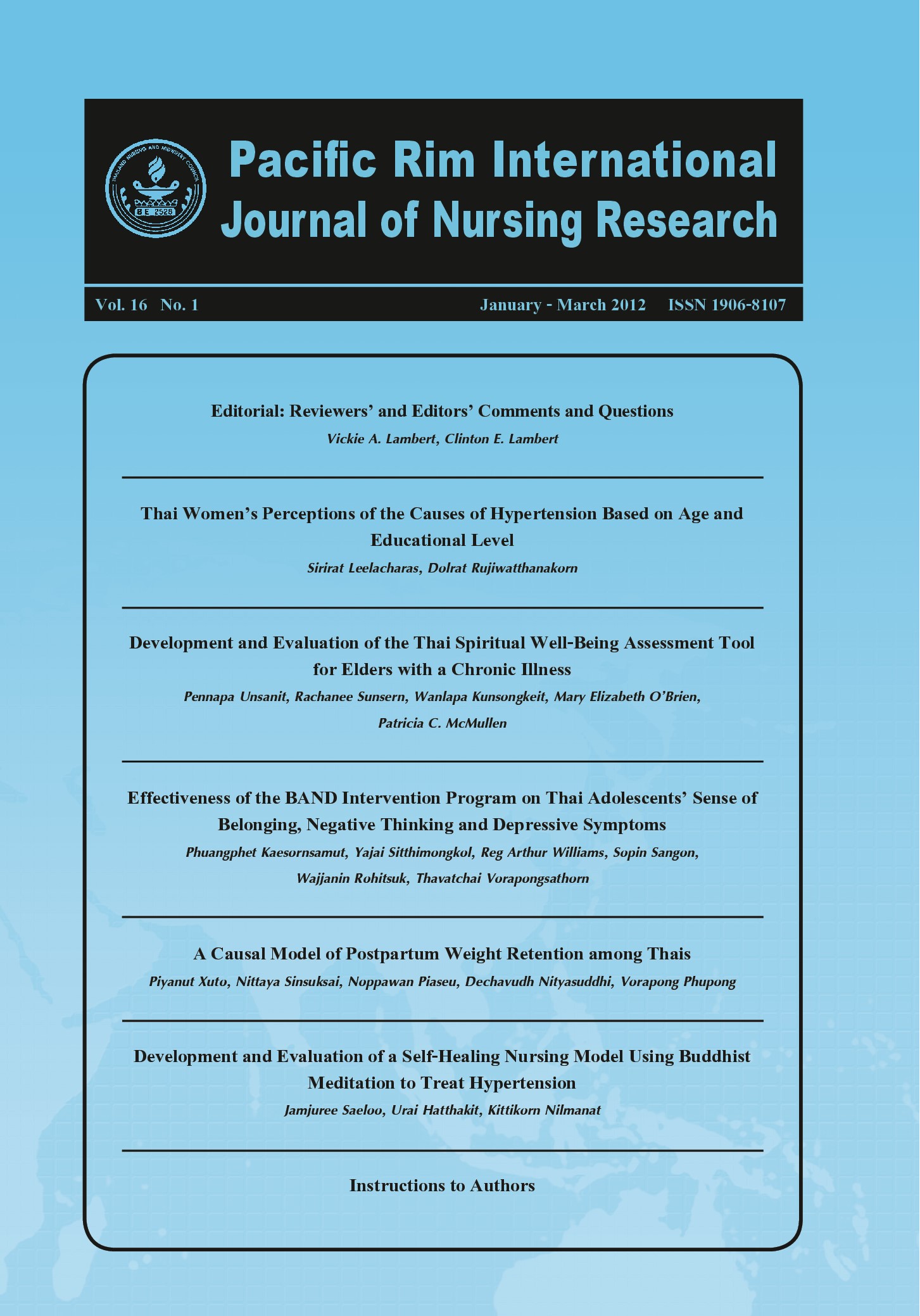Development and Evaluation of the Thai Spiritual Well-Being Assessment Tool for Elders with a Chronic Illness
Keywords:
ความผาสุกทางจิตวิญญาณ, เครื่องมือ, การพัฒนา, ผู้สูงอายุไทย, การเจ็บป่วยเรื้อรัง, Spiritual well-being, Instrument development, Thai elderly, Chronic IllnessAbstract
บทคัดย่อ
ความผาสุกทางจิตวิญญาณมีความสำคัญอย่างยิ่งต่อการรับรู้สุขภาพ และความเจ็บป่วยของผู้สูงอายุ เนื่องจากการที่มีสุขภาพอ่อนแอ สภาพร่างกายเสื่อมถอย ทำให้ผู้สูงอายุต้องเผชิญกับปัญหาสุขภาพ และการเจ็บป่วยด้วยโรคเรื้อรังประเด็นปัญหานี้จึงเป็นที่สนใจของผู้ให้บริการทางสุขภาพในผู้สูงอายุที่จะป้องกันและส่งเสริมสุขภาพของผู้สูงอายุโดยการส่งเสริมความผาสุกทางจิตวิญญาณ เนื่องจากพบว่าความผาสุกทางจิตวิญญาณมีบทบาทสำคัญในการช่วยผู้สูงอายุที่เจ็บป่วยด้วยโรคเรื้อรังจัดการกับปัญหาสุขภาพที่พวกเขาเผชิญในชีวิตประจำวันได้ แม้ว่าคำจำกัดความขึ้นอยู่กับ ประสบการณ์ประเพณี วัฒนธรรมของบุคคลนั้นๆ ในวัฒนธรรมไทยมีความรู้เกี่ยวกับแนวคิดนี้น้อยมาก และยังไม่มีเครื่องมือประเมินความผาสุกทางจิตวิญญาณ ถ้าไม่มีการพัฒนาเครื่องมือประเมินความผาสุกทางจิตวิญญาณที่เหมาะสมกับบริบทของคนไทย จะทำให้ผู้ให้การดูแลสุขภาพเผชิญกับความยากลำบากในการประเมิน และไม่สามารถให้การดูแลทางจิตวิญญาณที่เหมาะสมกับผู้สูงอายุที่เจ็บป่วยด้วยโรคเรื้อรังได้ ดังนั้นการศึกษานี้มีวัตถุประสงค์เพื่อพัฒนาและทดสอบคุณสมบัติของเครื่องมือประเมินความผาสุกทางจิตวิญญาณในผู้สูงอายุไทยที่เจ็บป่วยด้วยโรคเรื้อรัง
รูปแบบการศึกษาใช้วิธีการรวบรวมข้อมูลเชิงคุณภาพ และเชิงปริมาณ การสนทนากลุ่ม 3 กลุ่มและสัมภาษณ์เชิงลึกรายบุคคล ของผู้สูงอายุที่เจ็บป่วยด้วยโรคเรื้อรัง นับถือศาสนาพุทธ อิสลาม และคริสต์จำนวน 27 คน ในการศึกษาเชิงคุณภาพ 5 โดเมนของเครื่องมือประเมินความผาสุกทางจิตวิญญาณถูกพัฒนาขึ้นจากการวิเคราะห์เนื้อหาเชิงคุณภาพ ความตรงเชิงเนื้อหาตรวจสอบโดย ผู้เชี่ยวชาญด้านการพัฒนาจิตวิญญาณ ศาสนาเปรียบเทียบ และจิตวิญญาณการพยาบาลจำนวน 7 คน ผลการวิเคราะห์มีการปรับ เปลี่ยนคำของข้อคำถามเพียงเล็กน้อย มีค่าความตรงเชิงเนื้อหา .82-.95 ตรวจสอบความตรงเชิงโครงสร้าง และความเชื่อมั่นเบื้องต้นโดยใช้การวิเคราะห์ปัจจัย เชิงสำรวจในผู้สูงอายุที่เจ็บป่วยด้วยโรคเรื้อรัง ที่นับถือศาสนาใดศาสนาหนึ่งใน 3 ศาสนา จำนวน 600 คน จากการวิเคราะห์นี้มีผลให้เครื่องมีการปรับเปลี่ยนอีกครั้ง สุดท้ายเครื่องมือประเมินความผาสุกทางจิตวิญญาณ ประกอบด้วย 8 ปัจจัย 41 ข้อคำถาม และนำไปทดสอบความตรงเชิงโครงสร้างและค่าความเชื่อมั่นโดยใช้การวิเคราะห์ปัจจัยเชิงยืนยัน ในผู้สูงอายุที่เจ็บป่วยด้วยโรคเรื้อรัง ที่นับถือศาสนาใดศาสนาหนึ่งใน 3 ศาสนา จำนวน 2160 คน เครื่องมือนี้สามารถอธิบายความแปรปรวนทั้งหมดได้ร้อยละ 81.90 ทั้งฉบับมีค่าความเชื่อมั่นชนิดสอดคล้องภายใน .97 โมเดลที่พัฒนาขึ้นมีความตรงเชิงโครงสร้างค่อนข้างสูง ( 2 = 821.09, dƒ = 747,/dƒ 2 = 1.10, GFI = .96, RMSEA = .03, SRMR = .07) ดังนั้น เครื่องมือมีความตรงและความเชื่อมั่น สามารถนำไปใช้ประเมินความผาสุกทางจิตวิญญาณในกลุ่มผู้สูงอายุที่เจ็บป่วยด้วยโรคเรื้อรัง และในบริบทของไทยได้เป็นอย่างดี
คำสำคัญ: ความผาสุกทางจิตวิญญาณ; เครื่องมือ; การพัฒนา; ผู้สูงอายุไทย; การเจ็บป่วยเรื้อรัง
Abstract
Spiritual well-being plays a crucial role in one’s perception of health and illness. Due totheir vulnerable health, physical changes and deterioration, the elderly are at risk of encounteringhealth problems, including chronic illnesses. Thus, Thai health care providers are especially interestedin how the elderly maintain and promote their health through their sense of spiritual well-being. Anenhanced sense of spiritual well-being has been found to play an important role in helping elderlywith chronic illnesses deal with the health care issues they face on a daily basis. Although spiritualwell-being has been defined, based on one’s personal experiences, culture and context, little isknown about the concept and no known instrument exists to measure it within the context of the Thaiculture. The lack of an appropriate assessment tool for measuring spiritual well-being, within the Thaicontext, continues to make it difficult for health care providers, throughout Thailand, to measure andappropriately intervene with chronically ill elders in regards to their spiritual well-being. Therefore,the purposes of this study were to: develop the Thai Spiritual Well-being Assessment Tool for Elderswith Chronic Illnesses (TSWBATECI); and, assess the tool’s psychometric properties.
The study design used qualitative and quantitative approaches to gather data. Qualitativedata were obtained via review of the literature and three focus groups or individual interviews with27 elders with chronic illnesses, who declared to be of a Buddhist, Islamic or Christian faith. Fromcontent analysis of the qualitative data, the TSWBATECI was developed. Content validity of the toolwas examined by seven experts in spiritual development, comparative religion and spirituality innursing and resulted in minor revisions of the items’ wording. Following the content validity assessment,the instrument was given to 10 chronically ill elders who made suggestions on further itemrefinement so as to improve the tool’s clarity and readability. The revised tool then was pilot testedon 90 chronically ill elders, from the three faiths, for the purpose of determining what items shouldbe retained or deleted. Next, the instrument was administered to 600 chronically ill elders, who wereof one of the three religious faiths, to test its reliability and construct validity via exploratory factoranalysis. The outcome resulted in the tool being revised again, with the final version consisting of41-items. Finally, the reliability and construct validity of the 41-item tool was tested, using secondorderconfirmatory factor analysis, on 2160 chronically ill elders, who were of the three religious faiths.
The final version of the instrument was found to account for 81.90% of the total explained variance.The content validity index of the tool was determined to be 0.82 to 0.95, and its’ Cronbach’s alphacoefficient was found to be 0.97. The instrument could be accurately described as having a goodnessof fit ( 2 = 821.09, dƒ = 747, 2 /dƒ = 1.10, GFI = .96, RMSEA = .03, SRMR = .07). Thus, the ThaiSpiritual Well-being Assessment Tool for Elders with Chronic Illnesses appeared to be a valid andreliable instrument for assessing spiritual well-being of elderly Thais with chronic illnesses.
Key words: Spiritual well-being; Instrument development; Thai elderly; Chronic Illness
Downloads
How to Cite
Issue
Section
License
Copyright: The Pacific Rim International Journal of Nursing Research, Thailand Nursing & Midwifery Council has exclusive rights to publish, reproduce and distribute the manuscript and all contents therein.








.png)



